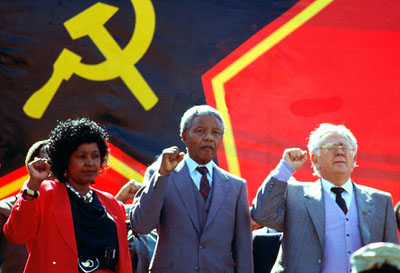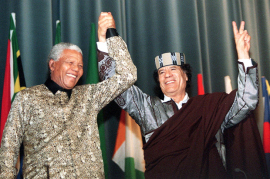Misrepresenting Mandela
Neither Israel’s President Shimon Peres nor Prime Minister Benyamin Netanyahu could attend the state funeral for the late South African President and liberation leader, Nelson Mandela. According to the Jerusalem Post they cited finance and security reasons instead sending a delegation headed by Speaker Yuli Edelstein and Knesset members as noted:
Knesset Speaker Yuli Edelstein flew Monday night to the memorial service, along with the first female Ethiopian MK Pnina Tamnu-Shata (Yesh Atid), as well as MKs Dov Lipman (Yesh Atid), Nitzan Horowitz (Meretz), Gila Gamliel (Likud Beytenu) and Hilik Bar (Labor).
If you wonder why Israel’s Peres and PM Netanyahu didn’t join 90 world leaders in attending the late Nelson Mandela’s state funeral, look no further than this column in theJerusalem Post by Michael Freund, “Misrepresenting Mandela”. It also struck me as indicative of the current ANC leadership that they would marginalize the late Helen Suzman, the lone member of the Progressive Party in the Pretoria Government of Botha, as the fiery opponent of Apartheid, suggesting that she had not done anything during her 13 years solitary role as opponent of Apartheid, See this April 2013 Mail & Guardian article, “ANC: Helen Suzman didn’t act against apartheid”.
Freund’s Jerusalem Post, oped, “Misrepresenting Mandela” chronicles his support for Israel’s enemies, the late Muammar Gaddafi and Yassir Arafat, as well as, convicted Puerto Rican terrorists here in the US. Let us also not forget that he was an avowed Communist penning a pamphlet to that effect. Go no further than his ANC comrade Joe Slovo, whom the New York Times in its 1995 obituary labeled him as an “Anti-Apartheid Stalinist”. Note this comment about the pivotal role that Slovo claimed:
But the men forged a friendship that grew into an unshakable political alliance. Over the years Mr. Slovo and other white Communists assumed influential places in the African National Congress. Mr. Slovo often said that his party’s greatest role was in steering the A.N.C. away from black nationalism to a doctrine of non racialism.
“The culture of non racialism is now deeply embedded,” he said in a recent interview, surveying the prospects of racial conflict in the future. “That has a great deal to do with the Communist Party.”
Freund’s assessment of Mandela’s legacy is best captured in his conclusion:
Mandela was flawed human being, full of contradictions and shortcomings, a man who alternately extolled violence and reconciliation.
Read what Freund chronicles as the late Mandela’s track record in his Jerusalem Post column:
Fundamentally Freund: Misrepresenting Mandela
Former South African President Nelson Mandela Photo: REUTERS/Elmond Jiyane/GCIS
Mandela was flawed human being, full of contradictions and shortcomings, a man who alternately extolled violence and reconciliation.
Imagine a person who planned acts of sabotage and incited violence, resulting in the deaths of innocent civilians and damage to public property.
A man who embraced brutal dictators throughout the Third World, such as Libya’s Gaddafi and Cuba’s Castro, singing their praises and defending them publicly even as they trampled on the rights and lives of their own people.
A person who hugged Yasser Arafat at the height of the intifada, hailed Puerto Rican terrorists who shot US Congressmen, and penned a book entitled, How to be a good Communist.
Picture all this and, believe it or not, you will be staring at a portrait of Nelson Mandela.
The death of the South African statesman last week has elicited an outpouring of tributes around the world, with various leaders and media outlets vying to outdo one another in their praise of the man.
Highlighting his principled stand against apartheid, and his firm determination to erect a new, post-racial and color-blind South Africa, many observers have hailed Mandela in glowing terms, as though he were a saint free of blemish and clean of sin.
But such accolades not only miss the mark, they distort history in a dangerous and damaging way and betray the legacy of Mandela himself.
Take, for example, the editorial in The Dallas Morning News, which likened Mandela to Moses and labeled him “the conscience of the world.”
And then there was Peter Oborne, the UK Telegraph’s chief political commentator, who wrote a piece entitled, “Few human beings can be compared to Jesus Christ. Nelson Mandela was one.”
Even taking into account Mandela’s astonishing accomplishments and harrowing life story, he is far from being the angel that much of the media is making him out to be.
After all, in 1961, Mandela co-founded Umkhonto we Sizwe (Spear of the Nation), the armed wing of the African National Congress, which undertook a campaign of violence and bloodshed against the South African regime that included bombings, sabotage and the elimination of political opponents.
Indeed, in his autobiography, Long Walk to Freedom, Mandela justified a car-bomb attack perpetrated by the ANC in May 1983 which killed 19 people and wounded over 200, including many innocent civilians, asserting that, “such accidents were the inevitable consequence of the decision to embark on a military struggle.”
His record of support for the use of violence and terror was such that even the lefties at Amnesty International declined to classify him as a “political prisoner” because “Mandela had participated in planning acts of sabotage and inciting violence.”
No less distasteful was Mandela’s unbounded affection for international rogues, thugs and killers.
Shortly after his release from prison in February 1990, he publicly embraced PLO chairman Yasser Arafat while on a visit to Lusaka, Zambia. The move came barely a month after a series of letter-bombs addressed to Jewish and Christian leaders were discovered at a Tel Aviv post office.
Three months later, on May 18, 1990, Mandela decided to pay a visit to Libya, where he gratefully accepted the International Gaddafi Prize for Human Rights from dictator Col. Muammar Gaddafi, whom he referred to as “our brother.”
While there, Mandela told journalists, “The ANC has, on numerous occasions, maintained that the PLO is our comrade in arms in the struggle for the liberation of our respective countries. We fully support the combat of the PLO for the creation of an independent Palestinian state.”
The following month, on his first visit to New York in June 1990, Mandela heaped praise on four Puerto Rican terrorists who had opened fire in the US House of Representatives in 1954, wounding five congressmen.
“We support the cause,” Mandela said, “of anyone who is fighting for self-determination, and our attitude is the same, no matter who it is. I would be honored to sit on the platform with the four comrades whom you refer to” (New York Times, June 22, 1990).
Even in later years, he maintained a fondness for those who used violence to achieve their aims.
In November 2004, when Arafat died, Mandela mourned his old friend, saying that “Yasser Arafat was one of the outstanding freedom fighters of this generation.”
Now you might be wondering: why is any of this important? It matters for the same reason that the historical record matters: to provide us and future generations with lessons to be learned and pitfalls to be avoided.
By painting Mandela solely in glowing terms and ignoring his violent record, the media and others are falsifying history and concealing the truth.
They are putting on a pedestal a man who excused the use of violence against civilians and befriended those with blood on their hands.
By all means, celebrate the transformation that Mandela brought about in his country, the freedom and liberties that he upheld, and the process of reconciliation that he oversaw. But to gloss over or ignore his failings and flaws is hagiography, not history.
And that is something Mandela himself would not have wanted.
In 1999, after he stepped down as South African president after one term in office, he said, “I wanted to be known as Mandela, a man with weaknesses, some of which are fundamental, and a man who is committed, but nevertheless, sometimes he fails to live up to expectations.”
Sure, we all need heroes, figures who seem to soar above our natural human limitations and inspire us to strive for greatness.
But Mandela was not Superman. He was neither born on Krypton nor did he wear a large letter “S” on his chest along with a red cape.
He was a flawed human being, full of contradictions and shortcomings, a man who alternately extolled violence and reconciliation according to whether it suited his purposes to do so.
And that is how it would be best to remember him.
EDITORS NOTE: This column originally appeared on The New English Review.




So, your saying that embracing dictators (for example, Rumsfeld embracing Saddam Hussein, or Bush holding hands and kissing the Saudi royals) is a bad thing?
After all, 17 of the 19 terrorists who attacked us on 9-11 were educated and supported by the Saudi nation. Their schools continue to teach hatred for the U.S. and western values. Yet we allowed their people to flee the country on Sept. 12th, and even ignored an obvious co-conspirator living in the Palmer Ranch community in Sarasota.
Ray, Thanks for reading this column and commenting. The problem is America has been embracing dictators, oligarchs and terrorists because the enemy of my enemy is my friend. This has been and is a failed international strategy. America should embrace the people in each country that seek freedom and liberty. Stick by the people and you will be on the side of good and be a beacon to the world.